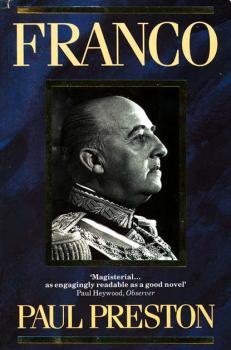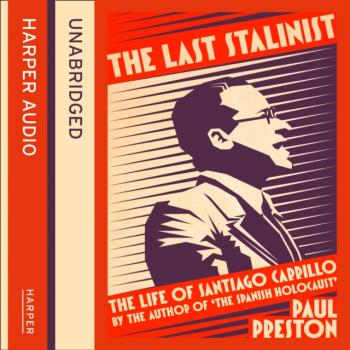Paul Preston
Список книг автора Paul PrestonEspaña en la guerra civil europea
La larga trayectoria historiográfica del profesor Paul Preston le acredita como el más relevante continuador de la fecunda tradición del hispanismo británico. El presente volumen quiere constituir un homenaje que completa el que se le rindiera con su nombramiento como doctor honoris causa de nuestra Universidad. En los textos aquí seleccionados se articula un enfoque coherente y, a la vez, complejo de la contemporaneidad española en su profunda imbricación con la historia del siglo XX europeo. Analizando dinámicas políticas y estructurales tanto como las vivencias y experiencias de personajes relevantes, se configura una aportación tan rica en el plano histórico como en el historiográfico.
A People Betrayed
From the foremost historian of 20th century Spain, A People Betrayed is the story of the devastating betrayal of Spain by its political class, its military and its Church. This comprehensive history of modern Spain chronicles the fomenting of violent social division throughout the country by institutionalised corruption and startling political incompetence. Most spectacularly during the Primo de Rivera and Franco dictatorships, grotesque and shameless corruption went hand-in-hand with inept policies that prolonged Spain’s economic backwardness well into the 1950s.A People Betrayed looks back to the years prior to 1923 when electoral corruption excluded the masses from organized politics and gave them a choice between apathetic acceptance and violent revolution. Bitter social conflict, economic tensions and conflict between centralist nationalism and regional independence movements then exploded into the civil war of 1936-1939.It took the horrors of that war and the dictatorship that followed to break the pattern. The moderation shared by the progressive right and a chastened left underlay a bloodless transition to democracy after 1975. Yet, as before, corruption and political incompetence continued to have a corrosive effect on political coexistence and social cohesion.Sparkling with vivid portraits of politicians and army officers, some corrupt and others clean, recounting the triumphs and disasters of Kings Alfonso XIII and Juan Carlos, A People Betrayed unravels the mystery of why both right and left have been unable or unwilling to deal with corruption and the pernicious clash between Spanish centralist nationalism and regional desires for independence.
The Spanish Civil War: Reaction, Revolution and Revenge
No war in modern times has inflamed the passions of both ordinary people and intellectuals in the way that the conflict in Spain in 1936 did.The Spanish Civil War is burned into European consciousness, not simply because it prefigured the much larger world war that followed it, but because the intense manner of its prosecution was a harbinger of a new and horrific form of warfare that was universally dreaded. At the same time, the hopes awakened by the attempted social revolution in republican Spain chimed with the aspirations of many in Europe and the United States during the grim years of the great Depression.On the 80th Anniversary of the conflict, this is a full-blooded account of this pivotal period in twentieth-century European history. Paul Preston vividly recounts the struggles of the war, analyzes the wider implications of the revolution in the Republican zone, tracks the emergence of Francisco Franco’s brutal (and, ultimately, extraordinarily durable) fascist dictatorship and assesses the ways in which the Spanish Civil War was a portent of the Second World War that ensued so rapidly after it.
Doves of War: Four Women of Spain
Love, war, duty, faith, betrayal and belief – a revolutionary new view of the Spanish Civil War through the eyes and experiences of the women who endured it, by the greatest historian of Spain: ‘Passionate and deeply moving… when Preston writes about these women, you feel as if you are in their company.’ Scotland on Sunday‘Four extraordinary women whose personal histories should dispel any illusions that the Spanish Civil War was an all-male war…Written with a shrewd eye and a sure touch, the book is full of wonderful stories and acute observations. Above all, these are compellingly human dramas in which moral issues, right and wrong, Fascism and Communism, melt away.’ Sunday TelegraphThe Aristocrat: PIP SCOTT-ELLIS fell in love with a Spanish prince and set off for Madrid in a chauffeur-driven limousine. She ended up nursing in front-line Francoist hospitals.The Communist: NAN GREEN, by contrast, travelled to war third class. Leaving her children behind in England, she went to fight for the International Brigade.The Intellectual: MARGARITA NELKEN was an art critic and novelist, who had translated Kafka into Spanish. Denounced as a whore by the Catholic Right, she became a radical politician.The Fascist: After her husband was killed in the fighting and miscarrying her baby on hearing the news, MERCEDES SANZ-BACHILLER set up a welfare organisation that was to change the face of Spain.‘Preston has harnessed biography to serve history by vividly telling the stories of four very different women whose lives were starkly altered by the conflict… significant, tragic and remarkable’ Irish Times
Franco
Generalissimo Francisco Franco, the Caudillo of Spain from the Nationalists' brutal, Fascist-sponsored victory over the Republican government in the Spanish Civil War until his quiet death in 1975, is the subject of this book.The biography presents a mass of new and unknown material about its subject, the fruits of research in the archives of six countries and a plethora of interviews with key figures. Paul Preston is the author of «The Triumph of Democracy in Spain» and «The Spanish Civil War 1936-9».
Juan Carlos: Steering Spain from Dictatorship to Democracy
A powerful biography of Spain’s great king, Juan Carlos, by the pre-eminent writer on 20th-century Spanish history.There are two central mysteries in the life of Juan Carlos, one personal, the other political.The first is the apparent serenity with which he accepted that his father had surrendered him, to all intents and purposes, into the safekeeping of the Franco regime. In any normal family, this would have been considered a kind of cruelty or, at the very least, baleful negligence. But a royal family can never be normal, and the decision to send the young Juan Carlos away from Spain was governed by a certain ‘superior’ dynastic logic.The second mystery lies in how a prince raised in a family with the strictest authoritarian traditions, who was obliged to conform to the Francoist norms during his youth and educated to be a cornerstone of the plans for the reinforcement of the dictatorship, eventually sided so emphatically and courageously with democratic principles.Paul Preston – perhaps the greatest living commentator on modern Spain – has set out to address these mysteries, and in so doing has written the definitive biography of King Juan Carlos. He tackles the king’s turbulent relationship with his father, his cloistered education, his bravery in defending Spain’s infant democracy after Franco’s death and his immense hard work in consolidating parliamentary democracy in Spain. The resulting biography is both rigorous and riveting, its vibrant prose doing justice to its vibrant subject. It is a book fit for a king.









